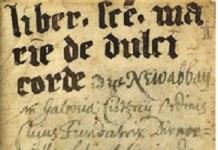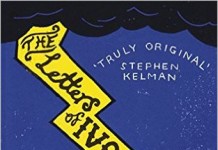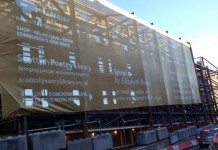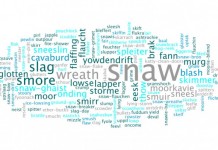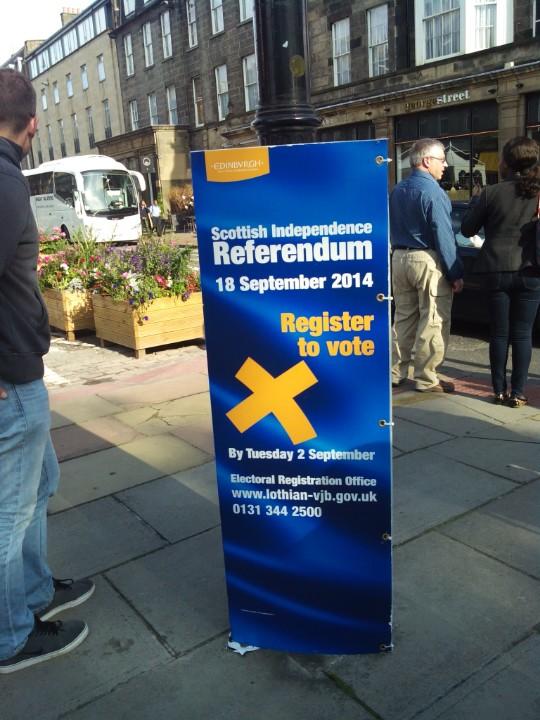 One of the highlight debates of the Edinburgh International Book Festival, “Writing the Future: Being a Writer After the Referendum,” hinged on the question of what the actual results of the independence referendum vote – whether Yes or No – might be for writers in Scotland. The panel brought together writers, publishers, and cultural policy professionals, from both sides of the Yes/No divide.
One of the highlight debates of the Edinburgh International Book Festival, “Writing the Future: Being a Writer After the Referendum,” hinged on the question of what the actual results of the independence referendum vote – whether Yes or No – might be for writers in Scotland. The panel brought together writers, publishers, and cultural policy professionals, from both sides of the Yes/No divide.
“The Society of Authors only sponsors one event in a book festival in the UK [annually], and this is that one event,” as Lin Anderson, author and chair of the Society of Authors in Scotland, said in her introduction. And the participants brought a level of engagement and passion to match the occasion, although by no means working from a simplistic Yes-is-good-for-Scottish-writers premise. All the same, “one thing that always struck me was the amount of respect shown to writers in Ireland … respect built into the way Ireland works,” said journalist and commentator Lesley Riddoch, mentioning, among other things, “the tax concessions, which make it much easier to be a writer or any kind of artist or creative person in Ireland.”
“There’s something else that comes from being an independent country. You get to a stage where you know your native culture and know its worth .. your own culture is your main selling point internationally,” she continued. “In Scotland there’s a two-tier set of values. There’s an official culture… There are two realities in Scotland all the time. There’s the mainstream British culture, which has occupied most of the space… and then there’s Scottish culture, sitting on the margins, in the corners, actually thriving, like a plant that adapts well to being stuck in funny wee corners … Scottish writing has thrived because it’s had to. lt’s been the carrier of different visions of what Scotland has been, could be, might become.”
Against Lesley Riddoch’s hope for “getting to the stage where that Scottish culture is the mainstream one,” author Alan Bissett was heavily concerned with the potential consequences of a No vote. As well as the likely consequence after a No that “Scotland’s block grant from Westminster will be cut significantly,” leading to funding challenges, he emphasized: “With a Yes vote, the anger that we see as a seam running through Scottish literature would ebb. We’d be less torn, there’d be less grievance, there’d be less sense of trying to make Scottishness into a quality, because we’d just be a normal country like every other country … We’d see a new optimism emerge from Scottish writers. With a No vote, we’d be trapped in 2014 forever. We will go back obsessively over this moment we’re living through. Because something, it feels like, is changing. There is a sense that Scotland’s moving forward, gathering speed, starting to stand up, and with a No vote, that momentum will be lost, and Scotland will become a poorer place.”
Bissett also cited the attention Scotland is getting from the world over the independence question, as manifested in his case by a whole series of press interviews. “Everybody in the world is interested in what’s happening in Scotland now,” he confirmed. “They all want to know what the artists have to say about this present moment in Scotland. With a No vote, the rest of the world will shrug and sigh, and move on. And we’ll become culturally irrelevant.”
From the No perspective, publisher Hugh Andrew, Managing Director of Birlinn Limited, complained about the “stupendous disinterest” demonstrated so far by the current Scottish government in cultural issues. However, he also linked Scotland’s cultural and literary problems to structural issues in publishing. “There are five gigantic corporations who control 90+ percent of the market,” he noted. “I am the last substantial Scottish-based Scottish-owned publisher in existence.” Even his locally-originated peers are moving away from home and into the Big Five’s orbit. “Much of Canongate is now based in London because that’s where the networks are.”


















